Growing up in the Canadian province of Alberta, Powell had a focus from an early age about what he wanted to do when he grew up. “My mother told me that when Christmas came around every year, I would ask for a doctor’s bag. In those days, your kit included a plastic otoscope and a stethoscope. The best part was the little box of sugar pills you could dispense to make people feel better.”
After finishing high school in Edmonton, Powell was accepted to study medicine at the University of British Columbia. In his second year he was to choose an elective. His choice: join the Flying Doctor Service in Darwin, Australia. As he was setting up that trip, he was given the opportunity to speed up his learning by stopping in Saigon, Vietnam, to observe at a MASH unit, and he was astounded at what he saw. Just like on the T.V. show M*A*S*H (which came later), wounded soldiers were brought in by helicopter. He already had enough medical knowledge to know, he said, that Canadian civilians “with this level of trauma would not have lived. They had very serious injuries, yet because they were moved so quickly with so much talent from the battlefield to the hands of the surgeon, they survived.”

After finishing his degree at UBC and residency in Calgary, Dr. Powell went on to more training at McGill University; at the time, that was Canada’s only emergency medicine training program; he wanted to be on the front line of saving lives. By the late 1970s he rose to be Director of Emergency Medicine at Foothills Hospital in Calgary, though admittedly that was an easy choice since at the time he was the only doctor in the entire city formally trained in emergency medicine. He helped the University of Calgary to set up its Emergency Medicine Residency training program, and helped form the Canadian Association of Emergency Physicians, which involved collaborating with other emergency doctors to build exams, create a board of examiners, and helped define the parameters for the Canadian emergency medicine specialty. And when that was done, he traveled to medical schools across Canada to “nudge” them to establish programs in emergency medicine.
In his spare time, thinking back to his experiences at the MASH in Vietnam and working on the helicopter in Australia, and seeing patients die because they didn’t get to a hospital in time, he wanted the lifesaving capability of medical helicopters in Canada too. That was especially driven by a woman who gave birth in a rural community, and died from blood loss. Early on, Dr. Powell had earned his pilot’s license, giving him a clear idea what was involved, and created a nonprofit to help. With seed money from the Lions Club, the Shock Trauma Air Rescue Services Foundation, and its working arm, the Shock Trauma Air Rescue Society (STARS), started a transport medical helicopter system, initially in Calgary. It flew its first mission on December 1, 1985, to save a critically ill infant. STARS now has six helicopters scattered among Alberta, Saskatchewan, and Manitoba, and has flown more than 60,000 missions across vast areas of western Canada covering most of five provinces. Dr. Powell himself flew in some missions that required very high levels of care.

In later years, honors piled up: among others, Powell was appointed to the Order of Canada in 2006, received the Alberta Centennial Medal in 2005, and the Queen Elizabeth II’s Diamond Jubilee Medal in 2012. In 2021, he received the Alberta Order of Excellence, the highest civilian honor granted by the Province of Alberta, in 2021. “His legacy today means countless people are given a chance they wouldn’t have had otherwise,” said his wife, Linda, “and it’s comforting to know his impact will endure.”
As for how his own legacy might inspire others, he said, “Recognize the seeds that are planted as you journey through your life, because you never know when you’re going to reach back in your memory and pull together an idea, a concept and make it happen — all because you paid attention to what was going on around you when you were young.” Dr. Dwight Gregory Powell, OC, AOE, FRCPC, died in hospice care on April 30. He was 77.
